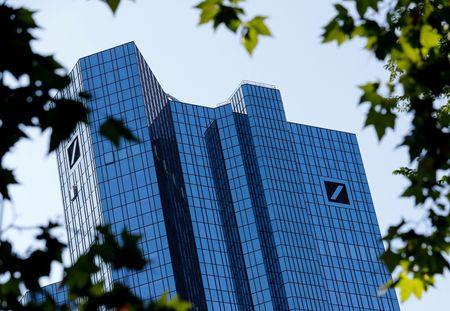By Tom Sims and Marta Orosz
FRANKFURT (Reuters) – Deutsche Bank CEO Christian Sewing on Thursday refused to rule out job cuts as the bank strives to lower costs, in a sign of the uncertainty facing the global financial industry as economic growth slows.
Sewing, who heads Germany’s top lender that reaches from New York to Sydney, said the bank was looking to reduce expenses and may cut here and there.
“We would be lying if we said otherwise,” he said, without going into details.
The comments followed forecast-beating quarterly earnings and a third consecutive year of profit, but underscored the challenges that lie ahead. The bank’s shares fell as much as 5% in early trade, before regaining some ground.
Some analysts were disappointed by a drop in fourth-quarter investment bank revenues and warned of risks from slowing economies, high inflation and peaking interest rates.
“There is little in these results to change earnings expectations if not the risk of a potential minor downgrade” this year, JPMorgan analysts said.
The results marked the end of a 9 billion euro ($9.9 billion), four-year turnaround plan put in place by one of the world’s most systemically important banks after years of losses.
The plan has stabilised the bank while a rise in interest rates has given lenders an additional lift, which Deutsche said would continue to boost revenue in 2023.
Net profit attributable to shareholders was 1.80 billion euros ($1.98 billion) in the three months to Dec. 31. That compared with 145 million euros a year earlier and analyst expectations of about 951 million euros.
It was a 10th consecutive quarter of profit, the bank’s longest streak in the black in at least a decade, though returns were dampened by an industry slump in dealmaking.
Full-year profit jumped to 5.03 billion euros from 1.94 billion euros a year earlier, beating analyst expectations for 4.17 billion. That was the largest annual profit since 2007, Deutsche said, helped by a 1.4 billion euro tax benefit.
Graphic: Deutsche Bank results- https://www.reuters.com/graphics/DEUTSCHEBANK-RESULTS/lbvggbolavq/chart.png
Germany’s biggest bank also exceeded its 8% target for return on tangible equity, reaching a figure of 9.4% thanks to the tax effect to achieve a milestone that Sewing had set for the bank when it embarked on its major overhaul in 2019.
Graphic: Report card- https://www.reuters.com/graphics/DEUTSCHEBANK-STRATEGY/dwvkdeakrpm/chart.png
“Over the past three and a half years we have successfully transformed Deutsche Bank,” said Sewing, who was promoted to the top job in 2018 to turn Deutsche around after a series of costly regulatory failings.
Still, analysts said the bank was vulnerable to economic headwinds, war on the continent and regulatory issues that have plagued it over the years.
Sewing, speaking at a news conference, said the bank was “slightly more optimistic”.
“Certainly, the geopolitical and economic situation is complex,” he said.
Andreas Thomae, a portfolio manager at Deka, a big Deutsche investor, said he was disappointed by Deutsche’s high costs relative to income.
Sewing said the bank was working to improve costs when asked about possible job cuts, adding the bank was still investing in growth areas.
In one notable example, Wall Street titan Goldman Sachs has been cutting staff.
At 1100 GMT, Deutsche shares were down 1.1% at 12.12 euros, recouping some earlier losses after management said share buybacks were on the table for this year.
INVESTMENT BANK
The bank in 2019 set out to reduce reliance on its volatile investment bank and restore profitability through more stable businesses that serve companies and retail customers.
It did not quite turn out that way, though the tide has turned more recently.
Revenue at Deutsche’s investment bank fell to 1.7 billion euros in the fourth quarter, down 12% from a year earlier and below expectations of 1.9 billion euros.
The investment bank’s origination and advisory business stood out, with revenue dropping 71%, mirroring slumps at other banks including Goldman Sachs and JPMorgan.
Revenue for fixed-income and currency trading, one of the bank’s largest divisions, rose 27% to 1.5 billon euros but was still short of the 1.7 billion euros expected by analysts.
The performance will be reflected in bonuses. The investment bank’s bonus pool for last year will fall by somewhat less than 10%, Reuters has reported, providing more evidence of tougher times in finance.
The investment bank’s revenue decline was countered by gains in corporate and retail banking, which registered increases of 30% and 23% respectively. The divisions had long stagnated under ultra-low interest rates that lasted longer than expected.
Graphic: Deutsche Bank shares- https://www.reuters.com/graphics/DEUTSCHEBANK-STRATEGY/gdvzqdwnjpw/chart.png
($1 = 0.9087 euros)
(Reporting by Tom Sims and Marta Orosz; editing by David Goodman and Mark Potter)

